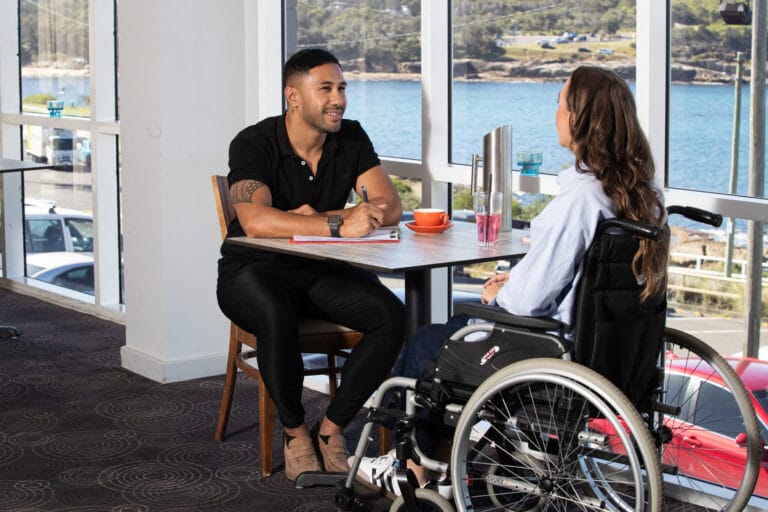The abilityNEWS Daily
The Big Story

Cheryl Soafkin searches for a suitable home for son Jeremy [photo courtesy The Age/Chris Hopkins]
Disability Homes on the Brink as Funding Cliff Looms
Almost 2000 Victorians with profound disabilities could lose their group homes when state subsidies end later this year. On Sunday The Age newspaper reported exclusively on the families and providers warning of evictions, closures, and collapse of care for residents.
Jeremy Soafkin lived in his Camberwell group home for 17 years. Now, at 37, his mother Cheryl is being told he may have to leave. The operator, Scope, says the house will shut within months. Jeremy doesn’t know the magnitude of what’s coming.
The Age reported on the human face of a looming collapse. Almost 2000 residents in Victoria’s supported independent living homes - people with severe autism, epilepsy, and other complex conditions - are on the edge of eviction. The reason? A funding stand-off between Canberra and Spring Street.
When the NDIS began Victoria agreed to hand over control of its group homes to five large not-for-profit providers: Aruma, Scope, Life Without Barriers, Melba Support Services and Possability. To smooth the transition, the state pumped in $2.1 billion to keep wages and conditions in line with the old government system. But those subsidies end on December 31.
Providers say they’re already cutting back with sixty homes closing in the past two years. The sector now has, on average, only a month’s cash in reserve. “There have been dozens of closures already,” Aruma’s Martin Laverty says. “There are tragically more to come.”
The Health and Community Services Union is blunt: “Five thousand of Victoria’s most vulnerable people will potentially be left homeless,” Victorian branch secretary Paul Healey warns.
The governments insist they’re working together, but time is running out. Families like the Soafkin’s need certainty and a roof over their heads now.
Editor’s Note
The Health Department is calling for written submissions and community feedback for Thriving Kids initiative. But with a closing date of Friday, 3 October there’s less than a month to submit.
Further information about how to make a submission to the parliamentary committee can be found here.
The Briefing

Feedback wanted for Review of Disability Discrimination Act
by Women With Disabilities Australia
The Australian Government is reviewing the 1992 Disability Discrimination Act to see if it still meets community needs. WWDA is gathering member feedback to shape its response and advocate for stronger protections for people with disability.
The importance of 'managing client experience'
by Nextt
Anna Di Pietrantonio directs client experience at Nextt and now brings over two decades of insight from work in the health and disability sectors to the job. But most critically her rise from support work to senior leadership reflects a deep commitment to empowering people with disability.
ADVOCACY STORIES - Assistance at first NDIS planning meeting
by Spinal Cord Injuries Australia
An advocate supported a woman living with Complex Regional Pain Syndrome through her first National Disability Insurance Scheme planning meeting. With guidance, she better understood the process and secured a plan suited to her needs, goals and health challenges.
ADVOCACY STORIES - Supporting client's life choices
by Spinal Cord Injuries Australia
A woman with a degenerative condition faced hospitalisation due to strained relations with support staff and service breakdown. Advocacy enabled her to secure more suitable providers, helping her maintain independence in her social housing unit.
ADVOCACY CHOICES - Challenging inadequate supports
by Spinal Cord Injuries Australia
A young woman with complex disability needs secured increased NDIS supports after her plan was found to be inadequate. An advocate helped her family successfully appeal for higher support levels through the Administrative Appeals Tribunal.
Special plan to help with money management
by Spinal Cord Injuries Australia
Spinal Cord Injuries Australia is partnering with Ability One to support a new model helping individuals manage personal care using lump sum payments. The Ability One Personal Care Model enables users to tailor care plans, choose carers, and increase independence at home.

[image courtesy Spinal Cord Injuries Australia]
The Wrap
New NDIS price cap for 'life changing' music and art therapy revealed after review
by ABC
Music and art therapists will be able to bill National Disability Insurance Scheme (NDIS) participants at the same rate as counsellors, after a review of their evidence base found they were effective. On Wednesday, the government reiterated therapy would remain available to NDIS participants and the maximum amount would be increased to $156.16, in line with the rate for counselling.
National Disability Insurance Scheme introduces tighter identity checks to protect against fraud
by 7 News
Identity checks will be tightened to ensure NDIS recipients and their nominated representatives are the only ones who can access NDIS funds, account information and plan details. “We’ll be checking that your account information is up to date and matches the information you use to access other government services, such as myGov,” the NDIS says.
Australia is at a critical point on fetal alcohol spectrum disorder
by Women's Agenda
A new landmark study, published by the University of Sydney in June, estimated that up to one in 28 Australians (3.64 per cent) may be living with FASD – that’s one child in every classroom, or two adults on a bus during peak hour.
Study finds people with disability need better support before and during emergencies
by ABC
A University of Sydney study has found 60 per cent of people living with a disability don't have an emergency plan. The findings have led Victoria's Country Fire Authority to create a pilot program that targets "higher risk" households to help create emergency plans.
The Diary

